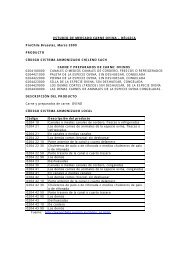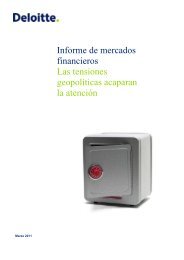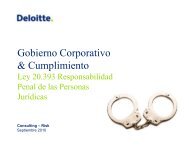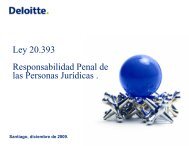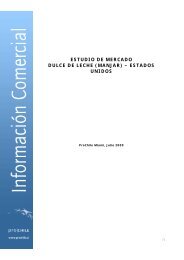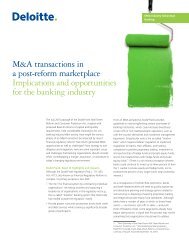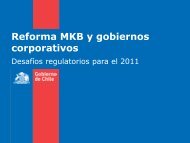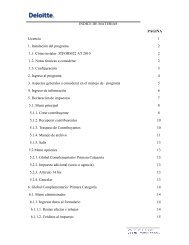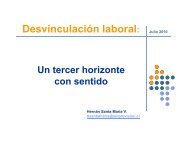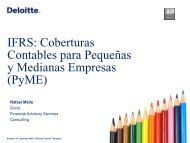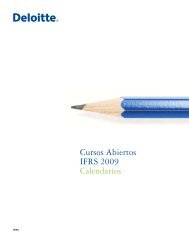- Page 1:
www.expertguides.com The Legal Medi
- Page 4 and 5:
Methodology Welcome to the 2007 Gui
- Page 6 and 7:
Argentina Taxes, the global picture
- Page 8 and 9:
Argentina Carlos Iannucci Deloitte
- Page 10 and 11:
Argentina Alejandro Claudio Altamir
- Page 12 and 13:
Australia Mark Green Minter Ellison
- Page 14 and 15:
Australia Charles Armitage Allens A
- Page 16 and 17:
Commercial Banking & finance and ca
- Page 18 and 19:
Austria Wolf-Dieter Arnold ARNOLD R
- Page 20 and 21:
Belgium for intellectual property;
- Page 22 and 23:
Belgium Jacques De Witte Deloitte B
- Page 24 and 25:
Belgium Jan A Roels Deloitte Berken
- Page 26 and 27:
Belgium Dirk Van Stappen KPMG Prins
- Page 28 and 29:
Belgium Bolivia Jan A Roels (see bi
- Page 30 and 31:
Brazil João Alfredo Branco Deloitt
- Page 32 and 33:
Brazil Gustavo Lian Haddad Lefosse
- Page 34 and 35:
Brazil Cristina Arantes A Berry (se
- Page 36 and 37:
Canada 2006 - a year of significant
- Page 38 and 39:
Canada Albert Baker Deloitte 1055 D
- Page 40 and 41:
Canada Brian R Carr Fraser Milner C
- Page 42 and 43:
Canada Wilfrid Lefebvre QC Ogilvy R
- Page 44 and 45:
Canada Warren J A Mitchell, QC Thor
- Page 46 and 47:
Canada Joel Alan Nitikman Fraser Mi
- Page 48 and 49:
Canada Michael J O’Keefe Thorstei
- Page 50 and 51:
Canada Sandra Slaats Deloitte 181 B
- Page 52 and 53:
Canada Jeffrey C Trossman Blake, Ca
- Page 54 and 55:
Canada Barbara Worndl Aird & Berlis
- Page 56 and 57:
Canada Firoz Ahmed Osler Hoskin & H
- Page 58 and 59:
Canada Alan M Schwartz Fasken Marti
- Page 60 and 61:
Chile Anthony Cook Deloitte Av Prov
- Page 62 and 63:
Chile Julio Pereira Pricewaterhouse
- Page 64 and 65:
China Joseph Tse Deloitte 30/F Bund
- Page 66 and 67:
Colombia Jaime Vargas-Cifuentes Del
- Page 68 and 69:
Cyprus Andreas Neocleous Andreas Ne
- Page 70 and 71:
Cyprus Andreas Neocleous (see bio)
- Page 72 and 73:
Czech Republic Jan Capek (see bio)
- Page 74 and 75:
Denmark Lars Loftager Jørgensen De
- Page 76 and 77:
Finland Arto Kukkonen HH Partners M
- Page 78 and 79:
Finland Outi Ukkola Deloitte Porkka
- Page 80 and 81:
France Pierre-Jean Douvier CMS Bure
- Page 82 and 83:
France Edouard Milhac CMS Bureau Fr
- Page 84 and 85:
France Claire Acard Ernst & Young,
- Page 86 and 87:
Germany New directions for tax in G
- Page 88 and 89:
Germany Hubertus Baumhoff Flick Goc
- Page 90 and 91:
Germany Michael Best P+P Pöllath +
- Page 92 and 93:
Germany Dieter Endres Pricewaterhou
- Page 94 and 95:
Germany Wilhelm Haarmann HAARMANN P
- Page 96 and 97:
Germany Jürgen Lüdicke Pricewater
- Page 98 and 99:
Germany Andreas Rodin P+P Pöllath
- Page 100 and 101:
Germany Wolfgang Tischbirek P+P Pö
- Page 102 and 103:
Germany Alexander Voegele NERA Econ
- Page 104 and 105:
Germany Holger Häuselmann Freshfie
- Page 106 and 107:
Hong Kong SAR Kaiser Kwan Deloitte
- Page 108 and 109:
Hong Kong SAR Vaughn Barber KPMG, H
- Page 110 and 111:
Hungary Péter Oszkó Deloitte Dóz
- Page 112 and 113:
India Mukesh Butani BMR & Associate
- Page 114 and 115:
India S Madhavan PricewaterhouseCoo
- Page 116 and 117:
India Pranav N Sayta Ernst & Young
- Page 118 and 119:
India Mukesh H Butani (see bio) BMR
- Page 120 and 121:
Ireland Aidan Fagan Deloitte Deloit
- Page 122 and 123:
Ireland Israel Fintan Clancy Arthur
- Page 124 and 125:
Italy Enrico Vitali Vitali Romagnol
- Page 126 and 127:
Japan Setsuko Fukushima Deloitte To
- Page 128 and 129:
Japan Ken Okawara Shin Nihon Ernst
- Page 130 and 131:
Japan Koichi Sekiya Shin Nihon Erns
- Page 132 and 133:
Luxembourg Luxembourg on the move R
- Page 134 and 135: Luxembourg René Beltjens Pricewate
- Page 136 and 137: Luxembourg Jean-Pierre Winandy Loye
- Page 138 and 139: Mexico Jaime González-Bendiksen Ba
- Page 140 and 141: Mexico Javier Goyeneche Deloitte Pa
- Page 142 and 143: Mexico Enrique Calvo Nicolau Calvo
- Page 144 and 145: The Netherlands The rapid changes i
- Page 146 and 147: The Netherlands Roderik Bouwman DLA
- Page 148 and 149: The Netherlands Rutger Hafkenscheid
- Page 150 and 151: The Netherlands Peter Willeme Deloi
- Page 152 and 153: The Netherlands Charles J Langereis
- Page 154 and 155: New Zealand While the FDR proposals
- Page 156 and 157: New Zealand Thomas Pippos Deloitte
- Page 158 and 159: Norway Svein G Andresen KPMG KPMG H
- Page 160 and 161: Norway Anders H Liland KPMG Law Adv
- Page 162 and 163: Norway Panama Svein G Andresen (see
- Page 164 and 165: Poland Leszek Tokarski Deloitte ul
- Page 166 and 167: Portugal Luís Belo Deloitte Praça
- Page 168 and 169: Portugal Diogo Leite de Campos PLMJ
- Page 170 and 171: Portugal Rosa Freitas Deloitte Edif
- Page 172 and 173: Portugal Miguel Leónidas Rocha Del
- Page 174 and 175: Russia Lioudmila Mamet Pricewaterho
- Page 176 and 177: Russia Alexander A Bychkov Baker &
- Page 178 and 179: Singapore Sum Yee-Loong Deloitte 6
- Page 180 and 181: Singapore Choy Wai Cheong Ernst & Y
- Page 182 and 183: South Africa It should also be note
- Page 186 and 187: South Africa Anne Bennett Deloitte
- Page 188 and 189: South Africa David Clegg Ernst & Yo
- Page 190 and 191: South Africa Michael Honiball KPMG
- Page 192 and 193: South Africa Sean Kruger Ernst & Yo
- Page 194 and 195: South Africa Mark Linington Webber
- Page 196 and 197: South Africa Anne Bennett (see bio)
- Page 198 and 199: South Korea So-Yong Kim Deloitte Ha
- Page 200 and 201: South Korea Il-Hwan Oh Samil Pricew
- Page 202 and 203: South Korea Sai Ree Yun Woo Yun Kan
- Page 204 and 205: Spain Tax reforms keep pace with ec
- Page 206 and 207: Spain Ángel Calleja Garrigues Herm
- Page 208 and 209: Spain Ricardo Gómez Garrigues Herm
- Page 210 and 211: Spain Antonio Valdivia Garrigues Av
- Page 212 and 213: Sweden Joachim Agrell Deloitte Rehn
- Page 214 and 215: Sweden Ernst Forsberg Pricewaterhou
- Page 216 and 217: Sweden Joachim Agrell (see bio) Del
- Page 218 and 219: Switzerland Peter Athanas Ernst & Y
- Page 220 and 221: Switzerland Walter H Boss Blum Atto
- Page 222 and 223: Switzerland Philip Robinson Ernst &
- Page 224 and 225: Switzerland Peter R Altenburger (se
- Page 226 and 227: United Kingdom Chris Adams Deloitte
- Page 228 and 229: United Kingdom Terry Awan Deloitte
- Page 230 and 231: United Kingdom Andrew Casley Pricew
- Page 232 and 233: United Kingdom Fred R Gander Dewey
- Page 234 and 235:
United Kingdom Steve Hasson Pricewa
- Page 236 and 237:
United Kingdom Andrew Hickman KPMG
- Page 238 and 239:
United Kingdom Charles G Lubar Morg
- Page 240 and 241:
United Kingdom Chris Rolfe Pricewat
- Page 242 and 243:
United Kingdom Eric Tomsett Deloitt
- Page 244 and 245:
United Kingdom Steve Edge Slaughter
- Page 246 and 247:
United Kingdom Eelco van der Stok F
- Page 248 and 249:
United States Foreign tax credit Fo
- Page 250 and 251:
United States William J Amon Deloit
- Page 252:
United States J Gregory Ballentine
- Page 255 and 256:
United States Henry J Birnkrant Als
- Page 257 and 258:
United States David H Brockway McKe
- Page 259 and 260:
United States Richard A Clark Deloi
- Page 261 and 262:
United States Robert T Cole Alston
- Page 263 and 264:
United States Philip C Cook Alston
- Page 265 and 266:
United States Maurice Emmer Deloitt
- Page 267 and 268:
United States James P Fuller Fenwic
- Page 269 and 270:
United States Jorge A Gross Pricewa
- Page 271 and 272:
United States Steven D Harris KPMG
- Page 273 and 274:
United States Kenneth H Heitner Wei
- Page 275 and 276:
United States Nancy L Iredale Paul,
- Page 277 and 278:
United States John P Kennedy Deloit
- Page 279 and 280:
United States Felix B Laughlin Dewe
- Page 281 and 282:
United States Marc M Levey Baker &
- Page 283 and 284:
United States Jerome B Libin Suther
- Page 285 and 286:
United States Carlyn S McCaffrey We
- Page 287 and 288:
United States Philip D Morrison Del
- Page 289 and 290:
United States Dan Munger Deloitte T
- Page 291 and 292:
United States William F Nelson McKe
- Page 293 and 294:
United States David Z Nirenberg McK
- Page 295 and 296:
United States Amin Nosrat Deloitte
- Page 297 and 298:
United States Jeffrey O’Donnell D
- Page 299 and 300:
United States Lawrence A Pollack KP
- Page 301 and 302:
United States Walter T Raineri Fenw
- Page 303 and 304:
United States Ronald D Saake Deloit
- Page 305 and 306:
United States Jodi J Schwartz Wacht
- Page 307 and 308:
United States Abraham N M Shashy De
- Page 309 and 310:
United States Richard W Skillman Ca
- Page 311 and 312:
United States Giovanna T Sparagna S
- Page 313 and 314:
United States Steven Surdell Ernst
- Page 315 and 316:
United States Leonard B Terr Baker
- Page 317 and 318:
United States T Timothy Tuerff Delo
- Page 319 and 320:
United States David R Warco Deloitt
- Page 321 and 322:
United States Thomas F Wessel KPMG
- Page 323 and 324:
United States Bob Ackerman Ernst &
- Page 325 and 326:
United States Robert E Culbertson K
- Page 327 and 328:
United States Ronald B Harvey (see
- Page 329 and 330:
United States Philip D Morrison (se
- Page 331 and 332:
United States Leslie J Schneider Iv
- Page 333 and 334:
United States Robert Wellen Ivins P
- Page 335 and 336:
Venezuela Oswaldo Anzola Rodríguez
- Page 337 and 338:
Deneys Reitz, 194 Dewey Ballantine,
- Page 339:
www.expertguides.com




